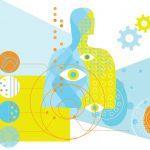Early life experiences influence DNA in the adult brain
Research led by Salk Professor Rusty Gage showed that the type of mothering a female mouse provides her offspring actually changes their DNA. The work lends support to studies about how childhood environments affect brain development in humans and could provide insights into neuropsychiatric disorders, such as depression and schizophrenia.
Featured Stories
 The immune system: a question of balanceThe immune system is a powerful biological force—a liquid organ that permeates our bodies. Diverse immune cells are constantly on patrol, hunting for miscreants to roust: bacteria, viruses, tumors, cellular trash. The immune system keeps us safe in a hostile world...
The immune system: a question of balanceThe immune system is a powerful biological force—a liquid organ that permeates our bodies. Diverse immune cells are constantly on patrol, hunting for miscreants to roust: bacteria, viruses, tumors, cellular trash. The immune system keeps us safe in a hostile world... Rusty GageComplacency has never been part of Fred (Rusty) Gage’s genetic make-up, neither as he has ascended to the ranks of the world’s most renowned neuroscientists nor as he’s taken the helm as President of the Salk Institute...
Rusty GageComplacency has never been part of Fred (Rusty) Gage’s genetic make-up, neither as he has ascended to the ranks of the world’s most renowned neuroscientists nor as he’s taken the helm as President of the Salk Institute... Emily ManoogianWhen Emily Manoogian was growing up, “scientist” wasn’t even on her list of potential careers. First Manoogian wanted to be a Broadway tap dancer; then a gymnast; later, a lawyer; and finally, towards the end of high school, a veterinarian.
Emily ManoogianWhen Emily Manoogian was growing up, “scientist” wasn’t even on her list of potential careers. First Manoogian wanted to be a Broadway tap dancer; then a gymnast; later, a lawyer; and finally, towards the end of high school, a veterinarian.
Support a legacy where cures begin.
Scientific discovery at the Salk Institute is made possible through your annual contributions. Your support will accelerate the pace of breakthroughs in understanding disease and pave the way to new drug therapies.
Get involved





















































